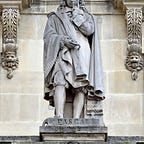Since its early days the crypto verse has evolved to become more complex, interconnected, and social. In its current point of development, social tokens, community governance, and DAO’s are on the forefront of crypto innovation. Inevitably, this means the emergence of a new role in the crypto-verse: The protocol politician.
As a deeply embedded member of the NEAR Ecosystem, this post will focus on protocol political development within NEAR — but the principles and larger examples, apply far above and beyond into the larger crypto space.
The Origin of Protocol Politics: A Short Primer
Protocol politics originates, the moment decisions, funds, and network designs are collectively decided on-chain. In the early days of crypto core teams or anonymous devs used to run their protocols and treasuries like monarchs. One — or a select group — would have all of the say on how the protocol operated. With the growth of these protocol ecosystems, and a deeper appreciation for decentralized decision making and community involvement, protocol politics has begun to emerge.
In its current form protocol politics revolves around tokens and DAOs: Either a social or governance token, can be purchased or distributed to provide a user with some form of decision making or vote on a protocol. Alternatively, a DAO might not opt to use tokens, but might simply allocate a certain ‘role’ to a specific Account ID. In both cases, community users are granted power to vote, propose, or elect changes and leaders to different aspects of their protocol.
As Mason Nystrom from Messari Writes:
“As crypto protocols grow in value, governance can become a meaningful mechanism to alter the state of the protocol. Because of this principle, the value of governance tokens is latent, but ever-present. The dormant power of governance tokens can be activated for multiple purposes whether 1) as a function or service required within the protocol 2) to control the assets of a protocol, or 3) to alter the existing parameters of a given network.”
In parallel, this leads to new avenues of attack on a protocol:
In essence, due to the fact that crypto’s are used in distributed ecosystems, they create the need for decentralized governance of such ecosystems. This in turn, creates the void that a robust and passionate community fills up — or alternatively does not. Recent episodes from The Defiant, showcase how slow VCs and other entrepreneurs are to figure out the new playbook that crypto puts forward: It’s nothing like a traditional project, or even a traditional business.
Characteristics of the New Protocol Politics:
Bankless had a fantastic newsletter on the original rise of protocol politicians that put forward some of the crucial questions surrounding the parameters of a protocol politician:
- Do they have skin in the game?
- Are they apolitical?
- Are they accountable to anyone?
- Are they captured by special interests?
Typical activities of a protocol politician would include:
- Voting on proposed changes to the protocol.
- Voting on allocations or budgets of a protocol treasury.
- Electing Chairs or Council Members to govern different areas of a protocol.
- Recruiting new community members to participate or engage with the ecosystem at hand.
These activities largely represent the very tip of the iceberg. On NEAR, with Sputnik V2 — the NEAR DAO Factory — there are thousands of possible combinations of roles and actions that a protocol politician would be able to partake in:
Protocol Politics on NEAR Protocol:
One of the leading reasons why the NEAR Ecosystem is one of the most exciting places to be in crypto is because of their community infrastructure: Sputnik V2, the NEAR Guilds Program, and a host of entirely community governed projects such as Ref.Finance + the proposed NEAR Ecosystem Treasury DAO, means that the Ecosystem as a whole is a fertile home for protocol politics, community innovation, and decentralized governance.
With social tokens, governance tokens, and more DAO innovation looming large on the horizon, it is clear that the Era of the Protocol Politician has only begun. An entirely new playbook of protocol politics, tactics, attacks, and development mechanisms is awaits creation.
Conclusion: A New Era of Politics is Here.
To conclude, I will leave you with some of the questions and comments on protocol politicians by notable figures like Ric Burton and others:
On the types of protocol politicians:
“ While almost 99% of protocol politicians will be motivated to increase the value of underlying holdings or from fees given to them for participating, we can envision a governance “Ghandi” which holds zero tokens, extracts zero rent, but has tons of voting weight. The politician is simply there for the greater good and long-term growth of the underlying protocol.” — The Life of a Protocol Politician
On the topic of the influence of these protocols:
Over time, I expect that the governance of these systems will start to have enormous impact on huge numbers of people. Protocol politicians will make decisions that have huge ramifications for people everywhere. — Ric Burton.
On the hundreds of remaining questions about protocol politics:
Imagine a monetary protocol with the power to affect global economies — a private, protocol-based central bank for open finance. How could such an institution exist without accruing political cruft at every open surface area of decision-making?
- Political parties
- Forks based on disputes
- Vote-buying markets
— Lobbyists & interest groups
